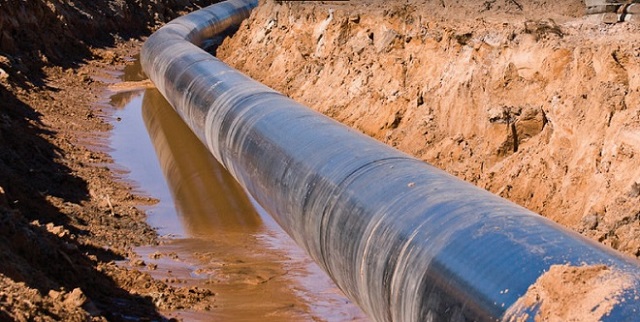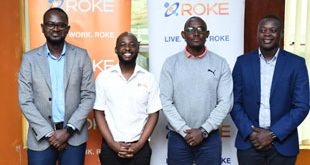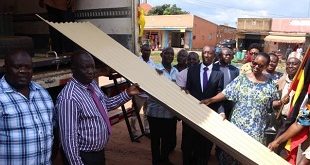
Hoima, Uganda | THE INDEPENDENT | The East African Crude Oil Pipeline is yet to compensate and support the relocation of 19 shrines along the pipeline route in Uganda. The latest information obtained from EACOP indicates that so far, five shrines have been relocated according to the tradition and expectations of the persons who operated them.
Initial studies indicated that twenty-five shrines had been identified in the districts of Hoima, Kikuube, Kyankwanzi, Kakumiro, Mubende, Sembabule, Gomba Lwengo, Kyotera and Rakai. However, according to EACOP, one shrine previously identified by JV contractors turned out to be non-existent.
Information about graves and shrines comes as the East Africa Crude Oil Pipeline (EACOP) dismisses allegations that it disrespected local customs regarding the relocation of graves and shrines in the project area.
Early this week, GreenFaith, an international anti-fossil campaign group alleged that the East Africa Crude Oil Pipeline (EACOP) will disturb 2,000 graves along its route from Lake Albert in Uganda to the Tanzanian port of Tanga.The report titled “As if Nothing is Sacred – TotalEnergies’ Mistreatment of Graves along EACOP” was published on 9th November 2023.
EACOP project is being developed by EACOP Ltd (“EACOP”), a company whose shareholders are TotalEnergies, China National Offshore Oil Corporation (CNOOC), the Uganda National Oil Company (UNOC) and the Tanzania Petroleum Development Corporation (TPDC) dismissed the report.
EACOP in a statement on Wednesday said that it regrets that it was not consulted by GreenFaith before the publication of that report and that “Both the specific allegations on grave relocations and the more general ones concerning numbers of people displaced or non-payment of compensations were not subject to elementary fact-checking” said the statement.
“If GreenFaith can provide specific cases of grievances that EACOP is not aware of, EACOP pledges to fully investigate and resolve them in full confidence”
URN had before the GreenFaith report talked to Fred Bazaara, Community Relations Coordinator for the EACOP on the issue of graves and shrines. He said owners of the shrines would get facilitation in cash before they could be relocated. The money according to Bazaara would be used to hire a traditional healer or witch to perform rituals for relocation.
“This is rather unique because with some projects, normally this facilitation is not given. However, EACOP felt that there is a need to provide this facilitation. Some of them would tell you that we need to carry out some functions,” he said.
“They would actually sit and agree on the budget. And then once the budget was agreed between the two parties, then go ahead would be given to relocate” he added.
One of those Project Affected Persons reportedly asked that he needed his witch doctor based in the Democratic Republic of Congo to come and perform the expiatory rituals.
According to a survey by New Plan, Rakai district had the highest number of households totaling six with eleven shrines altogether. Some of the households in Rakai had more than one shrine. Rakai still has eleven of the 19 shrines that are yet to be relocated.
Gomba and Kyakwanzi did not have any shrines. In Lwengo, one family had two shrines and both of them are pending relocation.
Of the relocated shrines, one is from Hoima, one is from Kikuube, and two from Kakumiro belong to the same household.
Bazaara did not however disclose how much EACOP has so far spent to particularly compensate shrine owners. He revealed that an official from the Uganda Museum has been involved in overseeing the exercises.
The shrines’ concern about the EACOP project is reminiscent of the early 2000s saga at the time when AES Nile Power and later Bujagali Energy were asked to foot costs for addressing the cultural and spiritual aspects of the project, in particular, the customs, practices, values, and religious significance of the Bujagali Falls.
A Cultural Property Management Plan (CPMP) was prepared in 2001 to cater for consultations with affected people and spiritual leaders associated with the Budhagali spirit. Several appeasement ceremonies were held.
The International Finance Corporation (IFC) of the World Bank recognizes, aspects of cultural heritage such as graves and shrines for their importance to current and future generations.
Apart from shrines, GreenFaith alleged that local communities told it that TotalEnergies has, on numerous occasions, disturbed and disrespected the graves of their families and ancestors. “This has taken place despite countless efforts of local people to alert TotalEnergies to the presence of the graves and about their concerns,” said the report.
The EACOP document indicated that 91.6% or 601 out of 656 of the graves in the 10 districts along the Ugandan side of the pipeline had been relocated by the beginning of November 2023. There had been reports that some of the would-be beneficiaries had dug graves and buried dogs in order in order to get compensation.
Fred Bazaara however indicated that all the graves were clearly identified and that human remains were exhumed from them.
“All Project Affected Persons (PAPS) were offered counseling before and after grave relocation activities. Ten PAPs were identified in need of and supported with psychosocial support due to grave relocation process (mental, emotional, psychological, social issues, etc.” reads the document.
GreenFaith said it documented cases of a lack of compensation for affected burial places; and incomplete or poorly constructed relocation sites.
Bazaara told URN that all of the graves were cemented by two contractors hired for the grave relocation exercise.
“It was dependent upon the engagement with the Project Affected Person. If there were any graves that were titled, then it meant that they had to be tiled by the project” said Bazaara.
TotalEnergies the majority shareholder in EACOP has insisted that will adhere to the World Bank project standards including those on cultural heritage.
“EACOP has consulted extensively to determine applicable cultural rites depending on the family or community/tribe to be fulfilled prior to and during grave relocation. Each household, community or tribe will have cultural and religious specificities which must be determined prior to relocation” said a statement.
The Energy and Mineral Development Minister, Ruth Nankabirwa recently told journalists in Kampala that opponents to EACOP have most times deliberately misinformed or delivered false information to the international public.
*****
URN
 The Independent Uganda: You get the Truth we Pay the Price
The Independent Uganda: You get the Truth we Pay the Price


